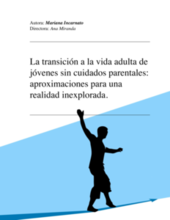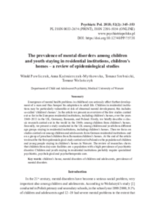Displaying 301 - 310 of 771
This study sought to investigate the lived experiences of care leavers from institutional care facility in Botswana.
This study aimed to assess both the prevalence of stress and the coping mechanisms as well as identify the predictors of stress levels among adolescents in Malaysian orphanages.
El trabajo se centra en el análisis de las trayectorias de un grupo de 199 adolescentes y jóvenes que viven o han vivido institucionalizados por una medida excepcional de cuidado, en siete provincias argentinas.
The Bucharest Early Intervention Project sought to examine the effects of foster care as an alternative to institutional care for abandoned infants in Romanian institutions.
In the current study the authors examined associations between children's pre-adoption experiences (type of pre-adoption care and early deprivation) and their adaptive and maladaptive behavioral adjustment.
This paper discusses findings from a small-scale qualitative study conducted in Harare, Zimbabwe. Findings show that young people aging out from Harare’s care institutions face challenges making their transition from care into adulthood.
This article reports on a systematic review of research on residential care-leaving in South Africa, from 2003 to 2016.
This article presents an overview of the few studies carried out so far in the European residential institutions, including children’s homes, over the years 1940–2011 in the UK, Germany, Romania, and Poland.
The purpose of this study was to understand the perspective of caregivers about the formation and disruption of bonds with institutionalized children in Brazil.
This study examines adult outcomes of youths (N=251) who spent time in a Dutch judicial treatment institution.


